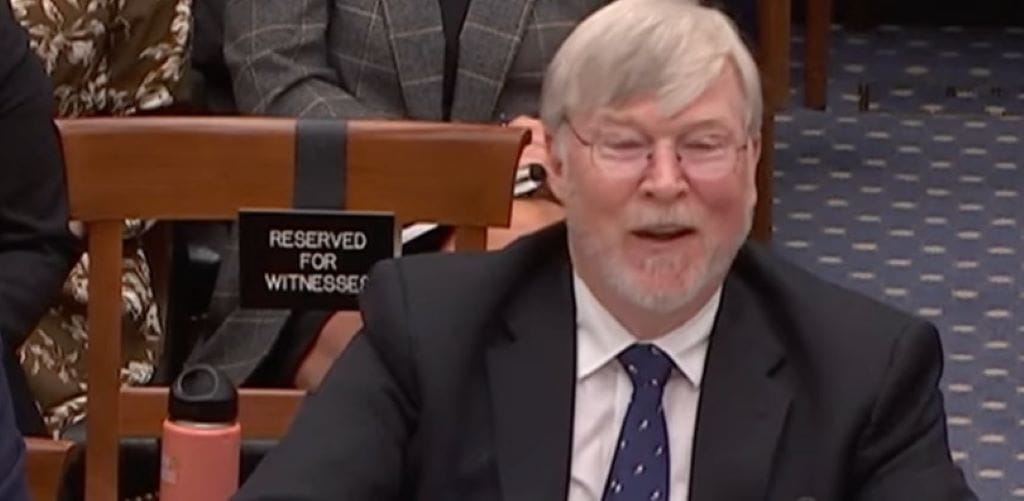Commenters Say BEAD Rules that Restrict Program Revenue and Letter of Credit Should Be Changed
Proposed changes to regulations would lift program revenue restrictions for recipients of BEAD funds.
Teralyn Whipple

WASHINGTON, August 4, 2023 – Commenters to the National Telecommunications and Information Administration Friday asked the agency to adopt modifications to program income restrictions in the Broadband Equity, Access and Deployment program.
Commenters addressed several restrictions in the BEAD program that would, they said, harm the subgrantee process. These include regulations that restricts how providers can use program revenue, whether subgrants can be fixed amounts, and if NTIA could eliminate or change the current letter of credit requirement for all subgrantees.
Current restrictions limit recipients of BEAD funds to use federal funding only to offset total allowable costs, satisfy cost sharing or match requirements, and to add to the total allowable costs for a project. Current rules put in place in the May 2022 Notice of Funding Opportunity state that recipients and subrecipients “may not earn or keep any profit resulting from federal financial assistance.”
In early July, the NTIA released a request for public comment that sought comment on changes to this rule and other rules as specified under the so-called “Part 200” rules of the Office of Management and Budget’s Uniform Guidance. Those rules are contained in the OMB’s Uniform Administrative Requirements, Cost Principles, and Audit Requirements for Federal Awards (2 CFR part 200) from 2013, and are incorporated into the BEAD NOFO.
Many commenters believe that these Part 200 rules will limit the efficacy of the BEAD program.
INCOMPAS, US Telecom, ACA Connects seek relief from some rules
INCOMPAS, the internet and competitive networks association, said in its comments that modifying program income rules will provide certainty to providers that they will be able to retain potential program income and allow for many types of organizations to compete for program funding.
The NTIA “should incentivize more parties to participate in the BEAD program and allow for greater competition in the grants process,” it said, claiming that more competition will better serve taxpayers and accomplish BEAD’s mission of connecting every unserved and underserved location in the United States.
Retaining the profits will help offset costs associated with build out networks that reach unserved and underserved communities, read INCOMPAS’s comments. “We need to ensure that the $42.5 billion allocated for the BEAD Program will not only incentivize more providers in participating in the grants process and stretch federal dollars even further but also to help create opportunities by offsetting those costs associated with deploying broadband network facilities to reach all unserved and underserved locations.”.
INCOMPAS added that broadband providers should have increased access to public rights-of-way to help “spur faster and more efficient deployments.” According to the association, its members have seen significant delays and increases in costs that could limit the effectiveness of the BEAD program. It urged the NTIA to be aware of the costs that these barriers incur on providers when making decisions to update BEAD regulations.
Broadband association US Telecom also expressed support for the program income modification, saying that the NTIA should follow the Department of Treasury’s approach to program income and allow subrecipients to retain the profits for use without restriction. “Waiving the program income rules creates a ‘profit opportunity that will improve the business case for all providers’ and help maximize incentives for participation,” it said.
ACA Connects, an association representing small and medium-sized telecom companies, said in its comments that “because subgrantees will likely seek to create efficiencies by jointly using broadband infrastructure, operations, and personnel for the BEAD program project and for non-government supported services, there may be no clear lines separating program income from non-program income, and attempting to draw these lines could be laborious and time-consuming.”
“Traditional funding rules may provide massive disincentives to existing broadband providers,” added James Dunstan, think tank TechFreedom’s general counsel in a statement. “These providers have already invested almost $2 trillion of private capital since 1996. In almost each instance, for existing broadband providers, the BEAD money will go toward expanding their existing networks into areas where there is simply no economic basis for deployment because of the cost, low population density, or even low demand for service. These new facilities will be integrated into larger networks, making it nearly impossible for the implementation of many of the conditions imposed by the Uniform Guidance rules.”
TechFreedom said in its comments that “if the rules are not written correctly, existing broadband providers – those entities in the best position to reach the most rural areas – may choose not to participate because of the uneconomic ‘strings’ attached to this federal money.”
The think tank said that subgrantee’s should not be able to profit directly from their capital expenditures, but that restrictions should be lifted after construction so that providers can receive a profit from the operation of the portion of their network built with a BEAD grant.
Some groups support fixed amount subgrants
Each state and territory will conduct a subgrantee selection process to identify subgrantees within their jurisdiction that will build and cooperate networks to deliver qualifying broadband service to every unserved and underserved location. The BEAD program is the first of its kind to mandate that all unserved areas are met with funds.
Telecom associations expressed support for the NTIA’s proposal to allow subawards to be fixed amount subawards, awards that provide a specific level of support without regard to actual costs incurred. Under current regulation, fixed amount subawards are prohibited in programs that require cost sharing or match, such as the BEAD program.
“Subrecipient grants should be in fixed amounts,” said TechFreedom, saying that any other approach would allow subrecipients to come back and seek more money. “Eligible Entities should set up their competitive rules such that applicants clearly state how much it will cost them to deploy into unserved and underserved areas.”
Not doing so would “engender all manner of waste, fraud, and abuse,” claimed TechFreedom’s comments. It would also require the NTIA to hold back a substantial amount of the $42.5 billion set aside for the BEAD program to cover cost overruns.
US Telecom claimed that providers will already be incentivized to ensure they estimate costs conservatively to maximize their chances of being selected. Not having fixed amount subawards would create “significant additional layers of complexity and cost for applicants, which do not customarily track and record costs.”
Brian Hurley, chief regulatory counsel at ACA Connects, said the association supports the proposed modification to the rules and believes they will result in projects that have measurable goals and are based on a reasonable estimate of actual cost.
Letter of credit panned by many commenters
As noted on a post in the broadband community, commenters also urged the NTIA to consider alternatives to the letter of credit requirement in the BEAD program Friday. Under current regulations, grant applicants must provide a letter of credit to demonstrate their financial capacity to meet the program’s obligations throughout the construction process. A letter of credit is a document a bank provides on behalf of a network operator to guarantee that in the event of default of the build, the bank will reimburse the agreed upon funds to the NTIA.
Grant awardees are required to submit a letter of credit of 25 percent of the project costs on top of the 25 percent match requirement. Connect Humanity said in its comments that “banks providing LOCs require that they be collateralized by cash or cash equivalent. As a result, awardees will have to lock away vast sums of capital for the full duration of the build, likely several years. With the additional 25% match requirement, recipients will have a capital hurdle of more than 60% of their grant.”
The LOC requirement will prevent the internet service providers best positioned to connect the unserved and underserved addresses of America from participating in the BEAD program, read the comments. It claimed that the banking sector has made clear that it does not “have the appetite to issue LOCs at the scale required to satisfy this $42.5 billion program.”
Even if banks are persuaded to provide LOCs worth up to $10.6 billion, the capital needed to collateralize them will have billions of dollars sitting idle not being used to buy equipment, lay fiber, and train the next generation of broadband engineers.
Furthermore, “the LOC shuts out the vast majority of entities the program claims to prioritize: small and community-centered ISPs, minority and women-owned ISPs, nonprofits and municipalities.”
Rural Texas Funders, SHLB, said letter of credit harms smaller providers
Rural Texas Funders, a nonprofit focused on rural philanthropy, said in its comments that it has found that the letter of credit requirement will also force smaller providers to move their banking outside of their communities. Large providers have existing relationships with banks with funds available for forthcoming projects whereas smaller providers have smaller banks that are not Weiss rated and not eligible to provide the letter of requirement.
The requirement will be “extremely difficult – if not impossible – for many of the communities that BEAD is designed to serve,” it stated.
The Schools Health and Libraries Broadband Coalition added in its comments that the LOC requirement may “effectively deny these smaller and community-based companies and non-profits an opportunity to bid for these projects.”
The coalition’s letter was signed by 49 parties, including representatives from Maine Connectivity Authority, Kansas Department of Commerce, Common Sense Media, American Association of Public Broadband, and Ready.net, among others.
“We appreciate the importance of ensuring that sub-recipients have adequate resources to complete the broadband deployment projects. We respectfully suggest that there are other ways to accomplish this goal,” read SHLB’s comments. It cited that other federal broadband programs require applicants to verify financial viability but do not require a letter of credit.
Among alternatives to the LOC, Connect Humanity and the SHLB Coalition suggested performance bonds, which are commonly used in construction projects and provide a financial guarantee for the delivery of the project without requiring providers to front such a large amount of capital to secure the funds, and delayed reimbursement models.
Delayed reimbursement which allows providers and state broadband offices to agree on a set of milestones that must be achieved to release grant funds, the letter continued. The grants will be issued to providers incrementally over the course of the build and will ensure that grantees are financially reliable.
“Eliminating the letter of credit requirement will promote competition and make it easier for smaller community-based ISPs, minority-owned and women-owned businesses, and nonprofit entities to be eligible for BEAD funding,” it concluded.








